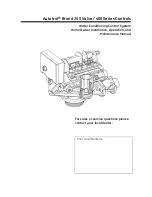
2. Remove residuals according to the waste disposal laws applicable in
your area.
To check the pressure in the storage tank [ Fig. M1 ]:
Check the pressure in the reservoir tank regularly.
The pressure in the storage tank must be approx. 1.5 bar. An air pump /
tyre inflator with pressure indicator (manometer) is required to refill the air.
1. Unscrew the protective cover
(13)
.
2. Open all the tapping points.
The pressure side is depressurized.
3. Place the air pump /tyre inflator on the tank valve
(14)
and refill with
air until the pressure display on the air pump/tyre inflator shows
approx. 1.5 bar.
4. Screw the protective cover
(13)
close again.
5. STORAGE
To put into storage [ Fig. S1 ]:
The pump is not frost-proof!
The product must be stored away from children.
1. Disconnect the pump from the mains.
2. If applicable, close all the shut-off devices on the intake side.
3. Open all the tapping points.
The pressure side is depressurized.
4. Open the screw fitting
(6)
of the filler neck
(7)
and the water drain
screw
(9)
.
The pump drains.
5. Store the pump in a dry, enclosed and frost-free place.
Disposal:
(in accordance with RL2012/19/EC)
The product must not be disposed of to normal household waste.
It must be disposed of in line with local environmental regulations.
IMPORTANT!
v
Dispose of the product through or via your municipal recycling
collection centre.
6. TROUBLESHOOTING
DANGER! Risk of injury!
Injury when the product starts accidentally.
v
Disconnect the product from the mains before you trouble-
shoot the product.
To loosen the impeller [ Fig. T1 ]:
An impeller blocked by dirt can be freed again.
v
Turn shaft of the impeller
(10)
with a screwdriver.
This will loosen the stuck impeller.
To clean the filter [ Fig. T2 ]:
If the pump does not start or stops suddenly during operation,
this may be due to a clogged filter.
1. Loosen the screw connection
(15)
.
2. Unscrew the filter
(16)
.
3. Clean the filter
(16)
under running water.
4. Assemble the filter
(16)
in reverse order.
Problem
Possible Cause
Remedy
Pump is running, but the
suction action doesn’t take
place
Leaky or damaged suction
hose.
v
Check suction line for
damage and seal so is
airtight.
The pump was not filled with
water.
v
Fill the pump
(see 3. OPERATION).
The liquid escapes over the
hose which is connected to
the delivery side during the
suction action.
v
1. Fill the pump again
(see 3. OPERATION).
2. When starting operation
hold the pressure hose
approx. 1 m vertically
above the pump, until the
suction action has taken
place.
Problem
Possible Cause
Remedy
Pump is running, but the
suction action doesn’t take
place
Absolutely vacuum-resistant connection is achieved by using
GARDENA Suction Hoses (see 8. ACCESSORIES).
Leaky screw fitting at the
filler neck.
v
Check seal (replace if neces-
sary) and tighten connection
securely (do not use pliers).
Air cannot escape, since
delivery side is closed or
remaining water is in the
pressure hose.
v
Open shut-off valves
(e. g. nozzle) in the delivery
line, empty the delivery hose
or disconnect it from the
pump during priming.
The waiting time wasn’t
observed.
v
Switch on the pump and wait
up to 5 min.
Suction filter or backflow
preventer in the suction hose
clogged.
v
Clean the filter or the back
flow preventer.
Too high suction height.
v
Reduce suction height.
In case of any other difficulties concerning the suction action,
use GARDENA Suction Hoses with Backflow Preventer
(see 8. ACCESSORIES) and fill in the liquid to be pumped
over the filler neck before operation.
Pump does not start,
or stops suddenly during
operation
Thermal switch has turned
the pump off because of over-
heating.
v
Clean the filter.
Observe the max. media
temperature (35 °C).
No power supply to the pump.
v
Check fuses and electrical
plug connections.
RCD has triggered
(residual current).
v
Disconnect the pump
and contact the GARDENA
Service.
Pump is not switched on.
v
Push the On / Off switch
to On.
Pump is running but the
delivery drops suddenly
Suction hose end is not
in water.
v
Submerge the end of the suc-
tion hose deeper in the water.
Suction filter or backflow
preventer clogged.
v
Clean the suction filter or
back-flow preventer.
Leaks at suction side.
v
Eliminate leak.
Impeller blocked.
v
Release impeller.
Noise development in the
hydraulic area
In the case of strong flows (e. g. open hose end, without connect-
ing device), noise may result in the hydraulic part of the pump.
This is harmless and does not lead to damage of the pump.
The noise can be removed by lightly changing the flow (e. g. light
opening / closing of a connecting device).
Pump switches on and
off too often
Tank membrane is damaged.
v
Let the tank membrane be
replaced by the GARDENA
Service.
Pressure in the tank is too low.
v
Refill the air in the storage
tank.
Leakage on the pressure side.
v
Eliminate leaks on the
pressure side.
NOTE: For any other malfunctions please contact the GARDENA service
department. Repairs must only be done by GARDENA service departments
or specialist dealers approved by GARDENA.
7. TECHNICAL DATA
Pressure Tank Unit
Unit
Value
(Art. 9020)
Value
(Art. 9022)
Rated power
W
600
800
Mains voltage
V (AC)
230
230
Mains frequency
Hz
50
50
Max. delivery capacity
l/h
3000
3600
Max. pressure /
max. delivery head
bar /
m
3,5
35
4,0
40
Max. self-priming suction
height
m
7
7
Working pressure p(W)
(switch-on to switch-off
pressure
bar
1.5 – 2.4
1.5 – 2.8
Permitted internal pressure
(delivery side)
bar
6
6
Power cable
m
1.5 (H07RN-F)
1.5 (H07RN-F)
Weight
kg
10.2
13.1
6
EN




























